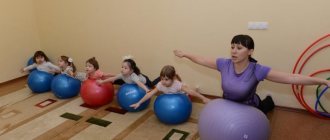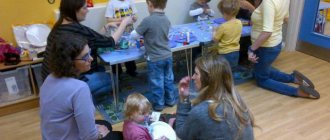System of health-improving and preventive work in kindergarten
Explanatory note
For effective, high-quality implementation of work on improving the health of kindergarten students and instilling in them a healthy lifestyle, it is necessary to develop a long-term action plan, which will clearly trace the system of work in this direction, the interaction of the institution’s employees responsible for health-improving and preventive measures. Such planning makes it possible to track children’s attendance at health-improving kindergartens. We manage two such kindergartens. Planning also helps in compiling an analysis of the incidence of children, monitoring the passage of medical care. inspection, etc., in the conduct of sanitary educational work. We are happy to share our planning with colleagues.
Plan for health and preventive work of the kindergarten "" for the 20th... year
| No. | Events | Dates | Responsible | Note |
| Organizational events | ||||
| 1. | Monitoring the incidence rate. | monthly | senior nurse | |
| 2. | Monitoring the health status of children entering the Kindergarten (new arrivals, after vacation, after illness). | as children arrive | senior nurse | |
| 3. | Monitoring the medical examination of kindergarten employees. | constantly | senior nurse | |
| Preventive actions | ||||
| 1. | Preparation of medical documentation, design of “Health Corners” in groups and the medical block. | September | senior nurse, group teachers | |
| 2. | Analysis of children's morbidity. | monthly | senior nurse | |
| 3. | Selection of a contingent of children from among the children's children for health improvement in kindergartens “Snow White” and “Morozko”. | quarterly | senior nurse, pediatrician | |
| 4. | Monitoring compliance with the sanitary and hygienic regime in the kindergarten and the sanitary condition of the premises of the kindergarten and site. | during a year | senior nurse, deputy head of medical care | |
| 5. | Monitoring the organization of meals and the implementation of an individual approach to children during meals. | during a year | head of d/s, senior nurse. | |
| 6. | Organization of dietary nutrition according to the indications of specialist doctors. | during a year | senior nurse | |
| 7. | Organization and holding of the “Week of National Cuisine”. | October | head of d/s, senior nurse, chef | |
| 8. | Interaction with specialists from kindergartens UDP LLC Gazprom Dobycha Urengoy “Snow White”, “Morozko”. | during a year | head of d/s, senior nurse | |
| 9. | Health activities: *C-vitaminization of third courses; *rinsing the mouth with boiled water and herbal decoctions; *multivitaminization; *herbal teas, licorice root syrup, rose hip syrup, etc.; *lubricating the nasal mucosa with oxolinic ointment. | daily, autumn-winter period during the winter period | senior nurse | |
| 10. | Providing prevention in children's activities: *breathing exercises; *articulation gymnastics; *formation of speech breathing; *prevention of flat feet and poor posture; *prevention of violations of the emotional-volitional sphere; *preventive work with children with visual impairments. | during a year | speech therapist, physical education instructor, educational psychologist, educators | |
| 11. | Organization of in-depth preventive examinations of children of maternity age with the involvement of specialized specialists (ophthalmologist, dentist). | during a year | senior nurse | |
| 12. | Observation of a dispensary group of children. | during a year | senior nurse | |
| 13. | Monitoring the organization of hardening activities. | during a year | senior nurse | |
| Anti-epidemic measures | ||||
| 1. | Planning and monitoring the implementation of preventive vaccinations in accordance with the national vaccination calendar and according to epidemic indications. | during a year | senior nurse | |
| 2. | Carrying out anti-epidemic quarantine measures in cases of infectious disease in the kindergarten. | during the quarantine period | senior nurse | |
| 3. | Carrying out preventive measures in unfavorable epidemic conditions. | during epidemics and seasonal morbidity | senior nurse | |
| Catering | ||||
| 1. | Organization of children's meals in accordance with SanPiN 2.4.1.3049-13. | during a year | head of d/s, senior nurse, chef | |
| 2. | Organization and holding of the “Week of National Culture”. | October | head of d/s, deputy head of medical and medical care, senior medical officer, chef | |
| 3. | Serving buffet breakfasts. | november | head of d/s, deputy head of medical and medical care, senior nurse, chef | |
| 4. | Organization of dietary nutrition according to the indications of specialist doctors. | constantly | head nurse, chef | |
| 5. | Organization of drinking regime. | constantly | head nurse, chef | |
| Sanitary education work | ||||
| 1. | Individual conversations with parents of visiting and newly admitted children. | during a year | senior nurse | |
| 2. | Speeches at general meetings of the Kindergarten, at parent meetings in groups. | throughout the year and upon request | head nurse, doctors | |
| 3. | Preparation of sanitary bulletins, reminders, health corners. | during a year | senior nurse, group teachers | |
| 4. | Conversations with team members, speeches at Pedagogical Councils. | throughout the year and upon request | head nurse, doctors | |
Wellness activities card index on the topic
Cycle of health activities
for children of middle preschool age
in a kindergarten setting
The goal of health work in kindergarten and, in particular, in our group is to preserve and strengthen the physical and mental health of children, improve the physical development of each child.
The system of health improvement work in kindergarten includes:
= creating conditions conducive to the favorable development of the body; = organization of rational motor activity of children; = carrying out specific (vaccination) and nonspecific immunoprophylaxis.
To effectively improve the health of children in the group, teachers observe and comply with sanitary and epidemiological norms and rules. The system of physical education and health work includes therapeutic and preventive and physical education and health activities.
Morning exercises /daily/- 7 minutes
- Gymnastics after sleep /daily/- 7 minutes
- Breathing exercises /2 times a week/
- Acupressure
- Air baths /before bedtime, after sleep/
- Physical education classes /3 times a week/ – 20 minutes
- Ventilation of groups, bedrooms / according to schedule /
- Finger gymnastics /3 times a week/
- Water hardening /daily/
- Fortification: juices/fruits/daily/
- Preventive vaccinations / individual vaccination calendar /
- Sun hardening /in summer/
- Prevention of flat feet /daily/
- Prevention of children’s posture /daily/
- Physical education minutes /daily/
- Outdoor games /daily/- 15 minutes (2-4 times a day)
- Walks /daily/
- Working with parents/carrying out health activities at home/
When organizing the physical activity of pupils, group teachers use an individual approach, remembering that physical activity must be adequate to the age and gender of the child, his state of health, level of development and biological maturity. We combine physical activity with generally available hardening procedures. At the same time, we make sure to include elements of breathing exercises in the complex of physical education.
| Physical education and health work (secondary group No. 3) | |
| Morning exercises | -Butsinskaya P.P. complexes No. 1, 2, 3, 4. -Kharchenko A.I. “Heroes of fairy tales” “We are slim”, “A clever squirrel”, etc. |
| Gymnastics after sleep | “Cheerful kitten”, “Walk on the sea”, “Walk in the forest”, “Slightly”, “Cheerful bugs”. |
| Acupressure | “Swan neck”, “Blowing away a leaf”, “Walking on the toes”, “Right nostril, left nostril”, etc. |
| Air baths | |
| Physical education classes | According to the plan, physical hand |
| Finger gymnastics | “Orange”, “Plate for Valerka”, “Snowball”, “Time to go to kindergarten”, etc. Special massage balls. |
| Physical education minutes | “Khomka”, “Pinocchio”, “Wind”, etc. |
| Outdoor games | “Find a Pair”, “Owl”, “Trap”, “Planes”, “Santa Claus”, “Fox and Hares”. According to the education plan - image. work of group No. 3 |
| Walks | According to the plan of educational work of group No. 3 |
| Water hardening | Washing with cool water |
| Walking barefoot before and after sleep | "Health Path"; massage mats. |
| Working with parents (consultations, conversations, moving folders, etc.) |
| “What is hardening”; "Clothes in kindergarten"; “This simple runny nose”; "Children's clothing in winter"; “Cautiously icy conditions”; “Gymnastics for children at home”; “Prevention of ARVI”; “Formation of proper breathing in children”; “Elements of breathing exercises”; “How to equip a sports corner for a child at home”, etc. |
The final result of completing the first annual task in our group was a wall newspaper (with parents) “My sports family” and a collage (with children) “My favorite sport”.
One of the areas of our activity is the formation of children's need for a healthy lifestyle.
Preschoolers should:
- understand the importance of a healthy lifestyle;
- understand the peculiarities of the functioning of the body, the rules for protecting the senses;
- serve yourself, analyze your actions and the actions of other children;
- interact with the environment, understand under what conditions the habitat (home, street) is safe for life;
- learn self-massage techniques;
- learn and understand which habits and why are harmful to health. How to behave correctly in society.
The result of our work: a decrease in morbidity. Such positive dynamics are observed in connection with the implementation of all health-improving activities. We believe that a comprehensive system of physical education and health work helps improve children’s health.

